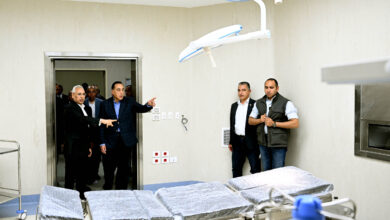When I came across a small kiosk in the Upper Egyptian city of Minya and asked for the hotel of Ibn Khassib, a young man in his twenties smiled at me, saying, "There is nothing easier for a stranger in Minya than finding the small hotel of Ibn Khassib."
The three-story hotel is located meters away from the central train station and behind the main church in the city. The hotel's centrality is not the main reason for the its fame, however.
Rather, it is known for its religious inclusivity.
In a country where sectarianism is becoming tangible in workplaces, where a growing number of Muslims and Christians have come to define terms of employment, career promotion, and even their spatial arrangements at businesses along religious lines, Ibn Khassib Hotel aspires to set a different example.
"I know that it's not common nowadays for a Christian project owner to have more Muslim workers than Christians or vice versa. But we haven't ever been sectarian, neither I, nor my father," said Osama Naguib Labeeb, the Coptic hotel owner who inherited the hotel after his father passed away.
The 59-year-old hotel has never been a "Christian space," Labeeb told Al-Masry Al-Youm, adding that of the hotel’s current 13-man workforce, seven employees are Muslims.
The 52-year-old trained engineer was not shocked by the 11 January train shooting in the nearby city of Samalout, when a Muslim policeman shot a Christian man dead and injured another five, including one of Labeeb's relatives. The Minya train shooting further fuelled anger within Egypt's Coptic minority, two weeks after the Alexandria church bombing that killed 23 Copts while they were leaving the New Year Eve’s mass.
"I'm taken aback because people were surprised by the attacks against Copts. This is a natural outcome as long as we keep denying the existence of sectarian strife,” said Labeeb, sitting in his hotel office beneath a large photo featuring the popular but apolitical Pope Kyrillos VI, the 116th Patriarch of the Coptic Orthodox Church and predecessor of incumbent Pope Shenouda III.
"Back in the 1970s we didn’t know or care what religion someone followed,” said Labeeb, a self-declared leftist. "Late President Anwar Sadat is to be blamed for the resurgence of religious divisions," he added.
The emergence of all Islamist groups, according to Labeeb, was partially encouraged by Sadat’s strategy to outweigh the stronger Marxist and nationalist groups who opposed his political and economic policies.
For Labeeb, the growing Islamization of Egyptian society had its impact within the Coptic community as well.
"The younger generation has gradually grown more bitter. We weren't like that. Churches masses were full of teaching about morals and ethics, but now it's centered about building a Coptic identity and being loyal to the church.”
Labeeb said that a look at the names of Coptic children provides a simple example of the transformation of Egypt into a religiously-divided society.
"In the past you couldn’t differentiate Muslim and Christian names. My name is Osama and my cousin's name is Hesham,” said Labeeb, referring to names that nowadays identify Muslim children.
“Now the names are either derived from Coptic heritage, or have Western connotations."




